To Listen, Click… Here

I’ve mentioned before that Japan is one of the most foreign cultures when compared to America, and that’s part of what has made it so intriguing. There’s been this exchange of either nation fetishizing each other. For me, one of the great things about modern Japanese cinema is how everything is genre, even when it isn’t, simply by function of its differentness.
That’s one of the things with Battle Royale II, is that despite its wonderful and characteristic production design, the action is surprisingly pedestrian, like how the movie Shiri was Korea’s answer to John Woo, but lacked that flair for true gun opera. It’s a strangely specific criticism, but a primary issue with both these movies is their propensity toward automatic weapons, which don’t mesh with the type of action they’re doing.
So to follow up our previous discussion of three remarkable scifi/horror movies, this is another negative review, but in this case, I don’t think I’ll have dissenters, but I promise… I’ll find a way. There’s a lot more to criticize with Battle Royale II than action, though, as you might imagine, and in fact it’s a competition of priorities — we have to work it out to find what really broke the camel’s back on this one?

There exists an accidental trope in media that I like to call Normalizing Terrorists. In this day and age of counterculture, or post-modern stuff, sometimes we’ll have stories where the bad guys are corporations or even the government, like a dystopian government. And so the heroes sometimes are freedom fighters. You have to be pretty careful with stories like Homeland, Continuum, and Ghost in the Shell 2nd Gig, and now we have a solid example of what happens when you’re not, and that’s Battle Royale II: Requiem.
But first, we ought to recap from the beginning, because I think that Battle Royale II really amplifies the things that were wrong with the first movie, which I really liked back when I saw it, but I doubt it would hold up to a second view.
Battle Royale was fairly popular among Quentin Tarantino, as well as socially awkward high school dorks, though I didn’t see it until college. It experienced a little bit of a resurgence in notice around that time because of the popularity of The Hunger Games, and for that, I have to call some bullshit.
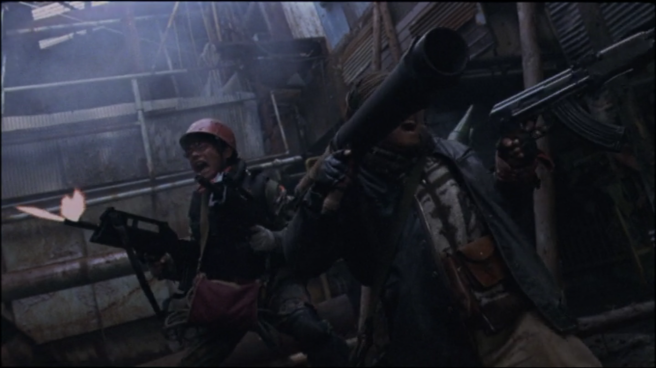
Storytime. So, Eli Roth, the director of Hostel and Cabin Fever, dropped in for a Skype visit at Fitchburg State, which was the college I attended, though I missed his appearance by a hair. I’d always liked Eli Roth despite never having seen any of his movies, because he seemed like one of the few nice guy directors out there, which happens more often than not with horror.
And if you’re wondering why Eli Roth would’ve made time for this no-name school, it’s probably because he’s a nice guy, but also because he grew up in Newton, Massachusetts, and there’s solidarity among people who grew up near Boston and probably say they lived in Boston even if they didn’t, because it’s tough and it’s the only notable place in Massachusetts.
My buddy at the time was there for the lecture, I guess, and I was honestly a little taken aback by something Eli Roth reportedly said, and it was something to the effect of “I liked The Hunger Games better when it was Battle Royale,” going on to explain that it was a rip-off, and that Battle Royale did it so much better.
Now first of all, you have to wonder if Eli Roth would also consider The Terminator a rip-off of The Outer Limits, but you know what? The Hunger Games is doing something different, and that’s worthwhile, regardless of its debatable thematic success, which I can’t speak to. I feel like this hostile, no pun intended, attitude comes from the fact that The Hunger Games is obnoxiously popular, and Battle Royale is foreign, so the assumption is that nobody else has seen it.

But it’s on Netflix, so you should encourage people to see it if you think it’s important. Even push it to fans of The Hunger Games, because you never know. There’s a great anecdote that David Cronenberg tells, about nearly being punched out by an actress on the set of Shivers, and there’s another one he tells about fans of Twilight. He was making his movie Cosmopolis, which was one of the first major things to star Robert Pattinson following the Twilight movies, and so it was inevitably going to attract some teenage vampire fans. Even I was making jokes about it back in the day, because I thought it was funny how the devotion of these little girls to their favorite actor would lead them to some terrible body horror as displaced from the 1970s.
People didn’t expect the fangirls would get it, and so Cronenberg was surprised when he saw websites that gathered these fans in order to talk about Don DeLillo’s Cosmopolis, before they saw the movie, and they were discussing it like human beings might. And meanwhile I couldn’t even watch the movie, I got about five minutes into it and turned it off. But I realized I could never make fun of fans of Twilight the moment I watched Veronica Mars, because most of why I liked that show could be summed up in the character Logan — the bad boy, you know.
But really, the reasons I liked Battle Royale was for the differences from The Hunger Games. I liked that Battle Royale was this quick and lowdown satire and The Hunger Games was this sprawling saga about a hero and a world and all that. You have two opposite approaches to the same material — The Hunger Games in addition has broad themes for a younger audience, and Battle Royale is an anarchic and spry comedy-horror with an obscene quality of violence. I know it’s tempting to say things are rip-offs and bemoan the lack of originality in Hollywood, but there is merit to revision and building on already established foundations. That’s the cornerstone of storytelling.

And if you’re offended that any current discussion of Battle Royale has to invoke and acknowledge and return to The Hunger Games, inescapably, welcome to my world. As a fan of Ghost in the Shell, people are not able to mention that without talking about The Matrix. Which is fine, because I like The Matrix, I like it better than the Ghost in the Shell movie, but I don’t like that it’s the sum of Ghost in the Shell’s significance.
Anyway, for Battle Royale, it’s really the comedy-horror element that jumped out at me the most. I used to talk about comedy-horror, and it’s still essentially my second favorite genre, because it pits realistic characters in fantastic situations, and they’re horrifically aware of these things that are going on, in a way that typical horror characters are not. In the early goings of life on the island, you have these idiots bumbling around trying not to shoot each other. It’s really entertaining, and when things get more serious you’re totally there with it.
It’s a fascinating idea executed really well, an author who thought that Lord of the Flies needed more than two casualties, and it’s directed by a veteran with decades of yakuza movie and scifi pulp experience to smash together and get this outlandish thing. Battle Royale came out in the year 2000, which was the same year as Ryuhei Kitamura’s Versus, and a year after Audition, possibly the only good movie by Takashi Miike. I like to think of that as a mini-Renaissance for Japan, which for westerners is one of two notable periods. Because it seems like in the 50s and 60s you had the big three, Kurasawa, Ozu, and Kobayashi, and then nothing until these movies, which made Japan once again influential on the global stage. Of course, you had anime in between, but Japanese live-action typically means Godzilla to most people, if it isn’t the Seven Samurai or the Guinea Pig movies?
And so after the year 2000 you get these crazy movies like Tokyo Gore Police and The Machine Girl and my personal pick, Hard Revenge Milly, and all these awful wonderful things with extreme gore and sex that answer the promise of those Good Lord Terrible Tetsuo movies. And meanwhile you have a sequel to Battle Royale, which is the eventual focus of our episode this week. Where the original was hailed as a classic, the sequel is difficult to touch. It is the last film Kinji Fukasaku worked on before his death, and it was completed by his son, Kenta, who had a specific ambition, one of those specific ambitions that becomes a runaway intent.

According to him, and Wikipedia, Kenta Fukasaku’s game was to cause outrage, saying that the more strongly people react, the better. Wow. That’s about as disrespectful to the notion of consequence as you can get, and in retrospect, it colors the conception of this movie as some puerile flailing in response to outrageous world events. Because it’s not giving me anything else, that’s the only conclusion I can draw.
There’s a fundamental flaw to this popular approach to dystopia, and Battle Royale II represents the far end of it, the farthest extrapolation of the idea. It’s been mentioned before, but my primary issue with stories like these, in the 1984 mold, is that it simplifies everything. In the case of The Hunger Games and Equilibrium, the dystopian government was created in response to war, and so they have this cheesy message at the end that’s like ‘we’re only human! Gotta love us, warts and all,’
This approach is more like “A Modest Proposal,” which is also something I despise, but the difference between Battle Royale and “A Modest Proposal” is that Battle Royale, as two movies, a manga series, and a novel, has never been brief. We dwell on the modest proposal at its core, and so it takes center stage and boxes out any possible constructive solutions.
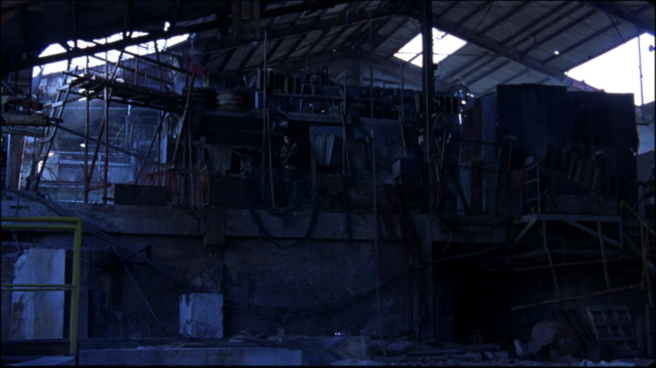
It becomes a story that is solely about identifying a problem, and then going on to explore the roots of that problem in a science-fictional way, satirizing how Japanese schools are so stress-inducing, that the psychological battlegrounds these students undergo are all mortar fire and stabbing people. And that’s a sad fact of life, because the Japanese are not wrong. Education is the foundation of society, it is the most important thing, but it can’t be done like this, that once a student strays from the path they’re barred from the plush future people are competing for, or are alternatively blown up by a neck collar, Running Man-style. Even all those tests they take in Azumanga Daioh, that’s some bullshit. I don’t care how many cultural festivals you throw. The entrance tests at Fitchburg were voluntary.
So it’s not like that message goes away, even if it’s diluted, and of course as a movie, it’s far more entertaining for the stylized action and dark humor than its political commentary. But it stops being okay when we extend the satire well beyond the limits of its world-building, and set up the logical next step for a sequel, in which we’re getting back at the dystopian government, raising our three fingers in the air and whistling about birds or something, and becoming freedom fighters.
Only, in this movie they’re straight-up about freedom fighters being terrorists, and they allude to the Middle East, which is their shorthand for the enemies of America. There’s a level of nuance required to tell a story with this amount of anger, and maybe Battle Royale island was not your arena to do so.

Because where the original movie was firmly embedded in a fantasy realm with a harsh, harsh streak of brutal reality poking through, this movie is kind of the inverse, taking a realistic approach to the fantastic, or rather the absurd. Child soldiers are not something we should laugh at, and the villain’s final moment is gloriously surreal but completely unearned.
This movie becoming the morbid transition between father and son makes sense, because Kinji Fukasaku is a well-documented filmmaker, who again, made his name with yakuza dramas and the occasional pulpy scifi adventure, so when you put those together, you get a master of tonal balance. Kenta on the other hand has a filmography that seems to spawn from the original Battle Royale only insofar as it takes lessons from one aspect of it, which is how we get Yo-Yo Girl Cop, the Sukeban Deka reboot, and a few other movies, which seem ridiculous on their face but aren’t straight comedies necessarily.
But beyond the poor handling of tone and the offensive premise, the movie loses itself because it makes no goddamn sense. Talk about breaking world-building — the Battle Royale II program could only make sense within the logic of itself, or from the perspective of the filmmakers, who were too deeply embedded in the mind-game of developing a new story out of a standalone movie.
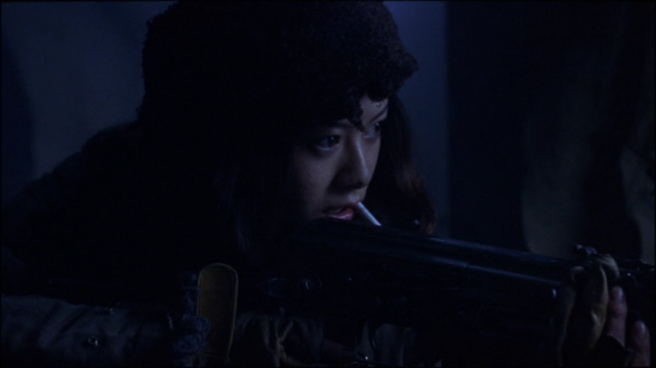
Why is the helicopter able to drop ammo over a contested beach? Why do they send Special Forces in only after the kids fail to complete the mission? Why have kids be soldiers at all if you have them fighting against their will? Why enforce a soldier’s motivation with a bomb collar that’ll detonate if your partner is dead or out of range? Aren’t numbers more important than attitudes especially when we’re talking about untrained children? Don’t you think there’s a good chance that the kids will want to ally with the other kids who are suffering the same situation?
Maybe it was all part of the villain’s plan, but in that case, what was the plan? To outfit the island with more child soldiers? I don’t think they needed them, and again, these kids were already the worst of the worst, that’s why they were chosen. To assassinate someone, let’s not forget, which is a marked difference than just ‘kill each other.’
And these kids, good Christ, I couldn’t remember not a one of them, certainly not their names. I only remember the main guy with the blonde hair, who’s like if you took the submachine gun asshole from the first movie and made him the hero. I think his name’s Taku, but I wrote it down as Taco because I’m fucking hilarious.
But that’s all excusable, to some extent. The big middle finger this movie gives to the world, which is directly a function of its layers of science-fiction extrapolation is how Shuya, the main character from the first movie and terrorist leader in this one, compares his situation to people in the Middle East, places like Iraq and Afghanistan which have been devastated mostly by American intervention, according to this movie.
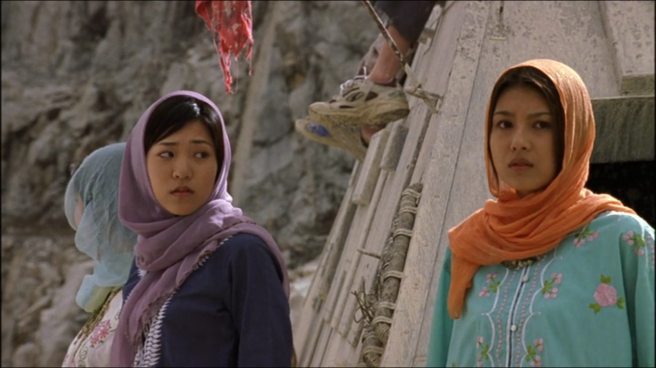
It would be fair for someone like Shuya to say that, unfortunately no such person exists. Shuya is a fictional character, but people of Iraq and Afghanistan are not. They’re very real, and their problems are very real. You can’t borrow their problems unless you have a really good reason.
We are trying to connect this fairy-tale to the real world, and that’s like putting two magnets together that are repelling or whatever, opposite poles. So what is the reason then, what’s the point that Battle Royale II is making, going to all these lengths in doing so, calling out the United States (soft mark) but in a manner that is so shortsighted, like the combined forces of a late night talk show host debating a conservative talking head. Everything gets simplified for the sake of time and other priorities, like slam-bang action and rugby.
Well, I think Battle Royale II, at the end of the day, at the end of all the things it does differently, is just being like all those other dystopian government movies. I don’t think it outright praises terrorism, so much as it comments on how terrorists can be created by imperialism and colonialism, and then if an ordinary person were to become a terrorist through wild means, it would be a miserable life. There are lines like “six billion people on Earth means six billion kinds of war,” and there’s this bleakness and tragedy to the whole thing.
The character Shuya in particular is the most subtle exemplar of this theme because terrorism has defined his life, making him this elderly survivalist figure who you really can’t imagine ever experiencing joy again, and at the age of sixteen or so.

I think that’s true to life, but it’s that normalizing terrorists thing again, straight from the horse’s mouth. Our boy Kenta wanted to explore what it meant to be a terrorist, and this is what it means. But terrorists are actually pretty bad people by nature, and we can say that because they’re defined by action, not by something artificial like race or gender. The term you’re looking for is revolutionary, but you’re giving it this bullshit post-9/11 spin for I don’t know what reason. To be edgy? Where do you live, man? I’ll fight you myself, tell me where you live!
Terrorism comes from a socioeconomic imbalance, people who cannot go toe-to-toe with a superpowered military, so they lay IEDs or sneak boxcutters onto flights. The problem is that these terrorists won’t make the distinction between enemy soldiers and enemy civilians — so long as they are of the same nation, they’re all subject to this military strategy, which can be so disproportionately brutal, like suicide bombs. But that’s the thing with the terrorists the US military has been fighting, to speak nothing of the domestic terrorists like these mass shooters.
The terrorists we’re fighting in the Middle East are primarily Islamic fundamentalists, and the kids in Battle Royale II are taking up arms out of absolute necessity, or at least, that’s how it’s portrayed, because a lot more (missing) justification will be needed for blowing up a building in Tokyo versus holding out on an island, so let’s focus on the island. We crazy kids here at The Battle Beyond Planet X have taken exception before to conflating things needlessly, because that’s a dark path to tread, better for other uses than wandering.
Don’t make your hero an Al-Quaeda terrorist, and don’t make the premise of your movie have to stretch and do these incredible acrobatics to justify it all, because then it loses all credibility and becomes bullshit. Look at a character like Hideo Kuze from Ghost in the Shell: 2nd Gig. Great character, and he seemed to come organically from that narrative. He called himself a terrorist, but what he ended up doing was getting in tight with freedom fighters so that he could reform their tactics toward non-violence.

And violence is once again a central element to Battle Royale, and I think that violence is ultimately the answer here. Look at the way the mineshaft scene plays out. After Shuya evacuates the island, Taco decides to turn back and help, and essentially asks, who’s coming with me?
This is the heroic turn, and it plays in contrast to the original recruitment scene, where the villain was calling out names and it takes so long that scene is like three hours long. Taco is joined by two guys, so they man up and go to war. It’s the difference between conscription and volunteering, but there’s some equity there. And of course, who do leave to run away but the women and children. The first Battle Royale was actually pretty egalitarian where gender was concerned, but this one has a strangely sexist streak. Women are more cowardly and they need to be protected, or are absent when they shouldn’t be, like Noriko, or Beat Takeshi’s daughter, who seems like she’s gonna play a role and then doesn’t?
The phrase ‘women and children,’ should be our preeminent example for the definition of infantilization. Which maybe isn’t a word? Well, I can’t very well say ‘emasculation,’ but truly, separating the human race into men, and then women and children — that super sucks. “Get the women and children to the lifeboats. I’ll take care of the ninjas!” But… women like to be protected! I can hear you muttering. That’s a little presumptuous, first of all, and second, that’s not really the point. It’s more about respect. Women should be able to protect themselves, because that ability is symptomatic of a plethora of things, respect being chief among them. Women are so delicate, and also, women are the only ones who can take care of children. But make sure you give the gun to the kid, and say you gotta protect our women, with a wink and a smile. I don’t even know why I watch movies, man, I clearly hate them.
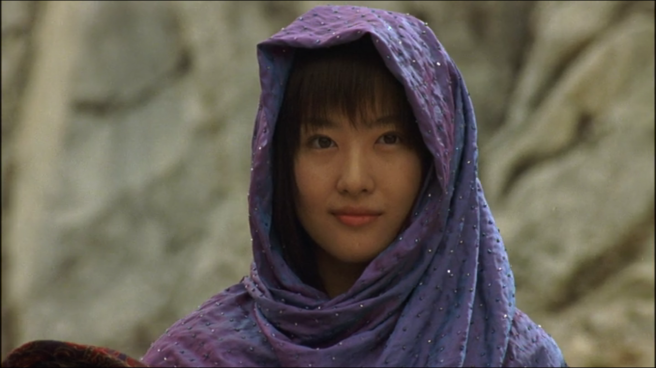
And this one in particular is so frustrating, because the thematic framework isn’t even cohesive enough for me to cite a key problem, for example violence, and then proceed to criticize it! Because in the end, Shuya is cured because he has friends and everyone’s happy, and… then what? Battle Royale II: Requiem, I tell you, you’re stepping all over my shit, dude — you’re not giving me the right opportunity to talk, as I’d really like to, about how these goddamn dystopias represent an outdated humanity, a planet of the apes where we’re just so stupid that we can’t talk shit over, because talking isn’t as fun as seeing teenagers blow up!
How about something new? A movie that isn’t all noise and generalizations, that doesn’t just set up a disturbing world to have some monosyllabic commentary about how it’s better to be free than enslaved, or even worse, that humanity is just fucked because we’re animals and there’s no point in trying to fix that because we’ll just overshoot and screw everything up. Let’s see something different than that, because we already have that, it’s been spoken for, now let’s try something more original.
And one last note on originality, let’s recall that Eli Roth talk at the top of the show for a moment. The author of the Battle Royale novel had something to say on behalf of The Hunger Games and I suppose the series’ author, Suzanne Collins, that every novel has something to offer, and if readers find value in either book, that’s all an author can ask for. It’s also what we should be asking for as readers, more, because originality isn’t born solely in premise. Sometimes it happens in and around the nooks and crannies of something that wasn’t original, like the old cinema iconography of Pulp Fiction, now given new meaning. Or A Better Tomorrow 2 before it, or Le Samourai before that. And then A Bittersweet Life and Drive, all better options than Battle Royale II for your Monday morning commute.

More is also better because the alternate is less, and I don’t want to live in one of these dystopian worlds where we reduce everything to the most prominent version, and we don’t experiment with what we have. But I mostly don’t want to live in dystopia because it’s boring and bleak. But that doesn’t mean stop making them, I just won’t be paying attention until someone slaps me across the face with the first special teenager YA novel that’s actually appealing. You’re special, special teenager! See, that’s really how you do it, you just opt out. Don’t let some rabid fanbase bother you and think that the eradication of what they like is somehow a better choice. Or, just keep that shit stowed, man. Nobody needs to hear it.
I think there’s some effort made to connect adults vs. children with educational reform with the War on Terror with the aspects of games and winning and losing, with the original movie, with fathers and daughters and war and violence and friendship and unfortunately, the effort wasn’t enough. It’s a tall order, but it’s hard to respect ambition when it fizzles and oozes and just kind of leaves a mess all over your floor.
 So final verdict on Battle Royale II — worst Christmas movie ever? Could be…
So final verdict on Battle Royale II — worst Christmas movie ever? Could be…
Here’s the thing — Gogo Yubari was cool. I think she should’ve won that fight. But I remember watching the first Battle Royale and first of all hoping that I’d be able to pick Chiaki Kuriyama out of the crowd because not only are these kids all Japanese they’re all like twelve years old. But second, I was hoping that she’d be badass like in Kill Bill, but she really wasn’t, so that’s a mystery. Whatever it is Quentin Tarantino saw in the young actress, I guess I’m glad..
BR2 sucked big time. Everyone else – do not bother watching it. BR is a masterpiece and the manga is just as good if not better. Shiri was pretty bad too.
I liked Shiri well enough, though I can’t remember a single detail about it
Silly, derivative badly written. JSA was so much better and memorable.
Well, it’s tough to compete with JSA. Even Park’s later filmography can’t quite match up…
Wow, not even the vengeance series?
Those movies are obviously great, but JSA really poked at my heart, and gave me a lot to think about